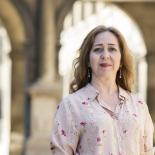Breadcrumb
Dr Vanessa Paloma Duncan Elbaz
Dr Vanessa Paloma Elbaz began her studies at the Universidad de los Andes in Bogotá, Colombia and completed a magna cum laude with honors degree at Oklahoma Baptist University. She received a Masters of Music at Indiana University Bloomington in Medieval and Renaissance Music under the supervision of Thomas Binkley. Her Ph.D. was awarded with félicitations du jury from Sorbonne’s CERMOM research group of the INALCO (Center for Middle Eastern and Mediterranean Studies of the National Institute for Oriental Languages and Civilization).
Dr Elbaz founded KHOYA: Jewish Morocco Sound Archive in 2013 to gather, classify, archive and disseminate sounds, music and audiovisuals of the remaining Jewish community in Morocco. She was awarded the H2020 Marie Sklodowska Curie Fellowship, a Posen Fellowship, and a Fulbright Senior Research fellowship. In 2018 she was presented with an award for Vivre Ensemble from the Marocains Pluriels Association and honoured for her cultural contributions to Morocco by the Hassan II Mosque's Foundation. In 2019 she received the inaugural Florence Amzallag prize from the American Sephardi Federation and Mimouna Association at the Center for Jewish History in New York.
Dr Elbaz is the Chair of the Mediterranean Music Studies Group of the International Council for Traditions of Music and Dance (ICTMD), and serves on the Boards of the Tangier American Legation Institute of Moroccan Studies and the Institute for Tolerance Studies.
Her work is regularly featured in the international press such as BBC, New York Times, Al Jazeera, i24, France24, L'Express, NPR, PRI, and Radio Pompidou among others and is a frequent consultant for documentary film projects and media pieces. She is an internationally known performer of Sephardi repertoires.
She is a Research Associate on the ERC-UKRI funded project Ottoman Auralities and the Eastern Mediterranean: Sound, Media, Power 1789-1922.
My work focuses on the cultural histories of sound in the diasporic regions of 1492’s expulsion, describing how issues of transmission, regeneration and the negotiations of gender and power intersect with sound, philosophy, and belief until today. Focusing on sonic transmission and languages of the Sephardi community and its diasporas as well as the use of music in relating to the national narratives of diversity in both Eastern and Western Mediterranean regions, my research combines ethnography and historical musicology to understand how voice, sound and music affect the long durée in diasporic communities. I also work on Judeo-Muslim relations through popular music and public diplomacy.
Forthcoming volumes include a multi-media monograph entitled Sontinuity: Cycles of Sound in Jewish Northern Morocco for Studies in the History and Society of the Maghrib, Brill, a Cambridge Elements monograph entitled Urban Objects of Aurality: Sephardi Songbooks in the Mobile Twentieth Century and a special issue of Journal Yod, Presses de l’INALCO “ Judeo-Spanish Songbooks as a Sonic Technology of Transmission”.
Refereed Journal articles
“Pour une ethnomusicologie de la Méditerranée ?” Lectures anthropologiques, 11, 2024.
“La Voz de la Mujer Sefardí: Entre tradición y creación” Cuadernos de Ethnomusicología, 18/1, 2023.
“KHOYA: Jewish Morocco Sound Archive: Post-colonial Jewish sounds, voices, memories”. American Archivist. 2023.
“Imagining a Sonic al-Andalus through Sound, Bones, and Blood: the Case of Jewish music in Morocco and Spain” Jewish Culture and History (2021) Published online October 22, 336-357
“Jewish Music in Northern Morocco and the Building of Sonic Identity boundaries” Journal for North African Studies (2021)
“Thomas Binkley’s Influence: Twenty Five Years On” Early Music, Volume 48, Issue 3, August 2020, 391–396
“De tu boca a los cielos: Jewish women’s songs in Northern Morocco as Oracles of Communal Holiness” Hesperis-Tamuda, Vol. LI- Fascicule 3 (2016) 239-261.
“Muslim Descendants of Jews in Morocco: Identity and Practice” Journal of Spanish, Portuguese and Italian Crypto-Jews. Vol 7 (2015) 41-60.
Selected Book chapters
“Sephardi Orature and the Myth of Hispanidad” Oral Literary Worlds: Location Transmission and Circulation, Edited by Francesca Orsini & Sara Marzagora, 2025, Open Book Publishers. p. 185-205.
“Land, Voice, Nation: Jewish Music in the Adamot of al-Andalus” ed. Tina Fruhauf in Oxford Handbook of Jewish Music Studies, Oxford University Press, 2023. 70-90.
“Oscillating Technologies of Sephardi Transmission: The Role of Notebooks and Orality” in Reflections on a New Mexican Crypto-Jewish Songbook. Ed. Seth Kunin, Lexington Books, 2023. 63-87.
“Listening to the ‘Other’ through the Ear: Contemporary Traces of Protectorate Politics through Music” Hommage à Mohammed Kenbib, ed. Khalid Ben Sghrir, Faculté des Sciences Sociales et Humaines de Rabat. 2021. 401-427.
“Connecting the Disconnect: Music and its Agency in Moroccan Cinema’s Judeo-Muslim Interactions” in Dynamic Jewish-Muslim Interactions across the Performing Arts in the Maghreb and France, 1920-2020. ed. Samuel Everrett and Rebekah Vince, Liverpool: Liverpool University Press (Francophone Postcolonial Studies series). 2020. 201-221.
“Los Cantares de las Antiguas: recuerdos sobre la transmisión femenina en el Norte de Marruecos" Actas del 18 Congreso de Estudios Sefardíes del CSIC, Madrid 2014. Ed. Aitor García Moreno and Elena Romero. Centro Superior de Investigaciones Científicas. 2018. 78-99.
“Kol b’Isha Erva: the Silencing of Jewish Women’s Oral Traditions in Morocco” in Gender and Law in the Maghreb, Ed. Doris Gray and Nadia Sonneveld, Cambridge University Press. 2017. 263-288.
“Judeo-Spanish Melodies in the Liturgy of Tangier: Feminine Imprints in a Masculine Space” in Musical Exodus: Al-Andalus and its Jewish Diasporas. Ed. Ruth Davis, Rowman & Littlefield. 2015. 25-43.
Online exhibit
Jewish Saharans Singing to Birth Launched October 2021

